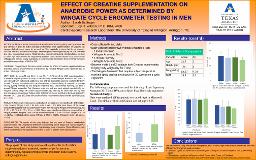
ATTENTION: The works hosted here are being migrated to a new repository that will consolidate resources, improve discoverability, and better show UTA's research impact on the global community. We will update authors as the migration progresses. Please see MavMatrix for more information.
Show simple item record
| dc.contributor.author | Ballinger, Sarah | |
| dc.date.accessioned | 2019-04-09T23:25:51Z | |
| dc.date.available | 2019-04-09T23:25:51Z | |
| dc.date.issued | 2018-12 | |
| dc.identifier.uri | http://hdl.handle.net/10106/27936 | |
| dc.description | KINE 4400 | |
| dc.description.abstract | **Please note that the full text is embargoed** ABSTRACT: INTRODUCTION: Creatine monohydrate is widely available and regularly used by amateur and elite athletes in order to better anaerobic performance. Oral supplementation of Creatine can increase skeletal muscle stores by as much as 20%, especially in those that do not regularly consume meat and fish because although Creatine is produced endogenously by the liver, the body also relies on exogenous sources. Phosphocreatine stores are considered a limiting factor for short duration, high intensity exercise. Augmenting available stores has been shown to decrease the rate of fatigue and increase energy availability to power muscular contraction force for longer durations and aid in the resynthesis of ADP to ATP.
PURPOSE: The purpose of this study was to evaluate the effects of creatine supplementation on anaerobic markers of performance as determined by repeated Wingate cycle ergometer tests in active, college-aged males.
METHODS: Six men (M; age 21.5 ± 2 yrs, 88.17 ± 9.70 kg) of the UTA student population, volunteered to participate in this study. A standard thirty second Wingate Anaerobic Test protocol was followed with participants pedaling as hard and fast as possible against a resistance for thirty seconds. The study was conducted in two visits with each visit consisting of a two-minute warmup of easy cycling followed by one Wingate Anaerobic Test, a four-minute recovery, and then a second Wingate Anaerobic Test. Between visits one and two, each subject ingested 0.3g per kilogram of body weight of Creatine (approximately 20g) each day for seven days. During each test, peak power, mean power, fatigue slope, and total work were recorded by the Lode Ergometry Manager (2017 Lode BV). Data were analyzed via a t-test with the alpha level for significance set at p ≤ 0.05.
RESULTS: Peak power, mean power, and total work averages were not significantly different (p > 0.05) between Wingate 1 and 2 for both visits 1 and 2. The RPM Peak Power of the second Wingate of the second visit was significantly higher than the second Wingate of the first visit (Visit 2: 137 ± 18, Visit 1: 119 ± 13; p = 0.01). There was a significant difference between Rate of Fatigue₅ between Wingates 1 and 2 of the first visit (Wingate 1: 28.49 ± 18.91%, Wingate 2: 40.49± 14.14% p = 0.04) but not the second (Wingate 1: 27.28 ± 23.29%, Wingate 2: 44.44 ± 20.51%; p = 0.30).
CONCLUSION: The results of this study indicate that one week of Creatine monohydrate supplementation had a significant difference on decreasing rate of fatigue and maintaining RPM peak power during repeat, short duration, high intensity bouts of exercise. These differences may further be attributed to the capability of Creatine to assist in a better, more rapid recovery. | en_US |
| dc.description.sponsorship | Faculty Sponsor: Judy R. Wilson | en_US |
| dc.language.iso | en_US | en_US |
| dc.publisher | The University of Texas at Arlington | en_US |
| dc.subject | Creatine supplementation | en_US |
| dc.subject | Anaerobic power | en_US |
| dc.subject | Wingate cycle | en_US |
| dc.subject | Ergometer testing | en_US |
| dc.title | Effect of Creatine Supplementation on Anaerobic Power as Determined by Wingate Cycle Ergometer Testing in Men | en_US |
| dc.type | Presentation | en_US |
| dc.publisher.department | Department of Kinesiology | |
Files in this item
- Name:
- Ballinger Creatine Poster.pdf
- Size:
- 819.8Kb
- Format:
- PDF
- Description:
- PDF
This item appears in the following Collection(s)
Show simple item record


